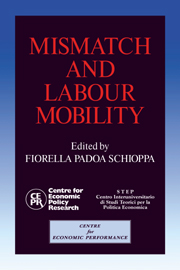Book contents
- Frontmatter
- Contents
- List of figures
- List of tables
- Preface
- Acknowledgements
- List of conference participants
- 1 A cross-country comparison of sectoral mismatch in the 1980s
- 2 Mismatch: a framework for thought
- Discussion
- 3 Match and mismatch on the German labour market
- Discussion
- 4 Mismatch in Japan
- Discussion
- 5 Mismatch and internal migration in Spain, 1962–86
- Discussion
- 6 Regional inequalities, migration and mismatch in Italy, 1960–86
- Discussion
- 7 Skill shortages and structural unemployment in Britain: a (mis)matching approach
- Discussion
- 8 Labour market tightness and the mismatch between demand and supply of less-educated young men in the United States in the 1980s
- Discussion
- 9 Skill mismatch, training systems and equilibrium unemployment: a comparative institutional analysis
- Discussion
- 10 Unemployment, vacancies and labour market programmes: Swedish evidence
- Discussion
- 11 Mismatch and labour mobility: some final remarks
- Index
6 - Regional inequalities, migration and mismatch in Italy, 1960–86
Published online by Cambridge University Press: 05 October 2010
- Frontmatter
- Contents
- List of figures
- List of tables
- Preface
- Acknowledgements
- List of conference participants
- 1 A cross-country comparison of sectoral mismatch in the 1980s
- 2 Mismatch: a framework for thought
- Discussion
- 3 Match and mismatch on the German labour market
- Discussion
- 4 Mismatch in Japan
- Discussion
- 5 Mismatch and internal migration in Spain, 1962–86
- Discussion
- 6 Regional inequalities, migration and mismatch in Italy, 1960–86
- Discussion
- 7 Skill shortages and structural unemployment in Britain: a (mis)matching approach
- Discussion
- 8 Labour market tightness and the mismatch between demand and supply of less-educated young men in the United States in the 1980s
- Discussion
- 9 Skill mismatch, training systems and equilibrium unemployment: a comparative institutional analysis
- Discussion
- 10 Unemployment, vacancies and labour market programmes: Swedish evidence
- Discussion
- 11 Mismatch and labour mobility: some final remarks
- Index
Summary
Migration is an effect, not a remedy: it is the way Southern peasants have found to subtract themselves from the evil, but it is not the solution to the evil…
Admittedly, migration corrects some of those intertwining problems out of which arises the so-called Southern Question (la questione meridionale): migration, for instance, forces peasants to go to school; it steps up their mental development bringing them in contact with the more civilised populations; it brings a considerable accumulation of capital into the Mezzogiorno of Italy. But it does not reforest ruined land, it does not eliminate malaria, it does not improve our suffocating tax and customs' systems, it does not help our authorities to improve and indeed it often worsens them, intensifying their perversion. On the other hand, it is accompanied by a phenomenon which is far from being good, the loosening of family ties…
Today, more than ever before, in the face of migration a serious, intense and systematic programme is necessary to solve the Southern problem; that is, to create in the South a moral and economic State where migration becomes in turn a positive element meant to accelerate the solution to the Southern problem (Salvemini, 1958).
Despite Italy's long tradition of mass migration to foreign lands, the notion that large-scale internal migration may need to be accepted, and even encouraged, as a way of evening-out inter-regional inequalities in income levels has found few sponsors.
- Type
- Chapter
- Information
- Mismatch and Labour Mobility , pp. 237 - 320Publisher: Cambridge University PressPrint publication year: 1991
- 32
- Cited by



